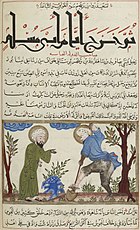
Behāfarīd (Middle Persian: Weh-āfrīd, Persian: بهآفرید, also spelled Bihāfarīd) was an 8th-century Persian Zoroastrian heresiarch who started a religious peasant revolt with elements from Zoroastrianism and Islam. He believed in Zoroaster and upheld all Zoroastrian institutions. His followers prayed seven times a day facing the Sun, prohibited intoxicants, and kept their hair long and disallowed sacrifices of cattle except when they were decrepit. His revolt was quelled by the Abbasid general Abu Muslim, and he was executed by hanging. His followers, however, believed that he would descend again. Some of his followers joined the Ustadh Sis movement.
See also
References
- Encyclopædia Iranica, BEHĀFARĪD, Zoroastrian heresiarch and self-styled prophet, killed 748-49
- Al-Bīrūnī: Father of Comparative Religion
External links
Sources
- Crone, Patricia (2012). The Nativist Prophets of Early Islamic Iran: Rural Revolt and Local Zoroastrianism. Cambridge University Press. pp. 1–543. ISBN 9781139510769.
This biographical article about an Iranian religious figure is a stub. You can help Misplaced Pages by expanding it. |